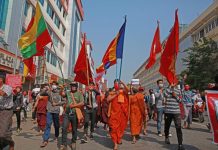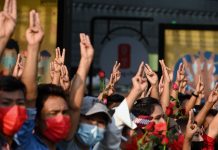
Thailand bans gatherings of five or more people as well as messages that threaten national security as street protests escalate.
This is the latest move of the Thai government under an emergency decree to keep the protests in Bangkok under control.
Protests calling for the resignation of Prime Minister Prayuth Chan-ocha have escalated for three months and camps have been set up outside his offices. According to the government, it took action after protesters obstructed a royal motorcade.
“It is extremely necessary to introduce an urgent measure to end this situation effectively and promptly to maintain peace and order,” state television announced.
The Thai government issued a document specifying the rules that took effect from 4 AM local time (2100 GMT) to prohibit big gatherings and allow authorities to ban people from going to areas of concern.
As Thailand bans gatherings, the government also prohibits: “publication of news, other media, and electronic information that contains messages that could create fear or intentionally distort information, creating misunderstanding that will affect national security or peace and order.”
Protesters want Prayuth, who took power in a 2014 coup, out. They are also calling for a new constitution and reduction in the powers of King Maha Vajiralongkorn.
Protesters yelled at the king’s motorcade in Bangkok following the arrest of 21 protesters. During a convoy carrying Queen Suthida, some protesters showed the three-finger salute and shouted “get out” at police keeping the vehicle protected.
Intimidation of critics
Experts believe that this week would be the turning point for the protest movement, which calls for a new constitution, the dissolution of parliament and resignation of Prime Minister Prayut Chan-o-cha, as well as a stoppage in the government’s intimidation of critics.
While protest leaders are expecting a high turnout, some people are questioning whether they were pushing too hard for monarchy reform and whether people are willing to take to the streets amid the pandemic and October rainfall.
Wednesday marks the anniversary of the 1973 mass uprising against military dictatorship and was also the late King’s memorial day.
Punchada Sirivunnabood, associate professor of politics at Mahidol University’s Faculty of Social Sciences and Humanities, said: “I expect that the government would control this protest very hard.”
"Same vicious political cycle"
Panusaya Sithijirawattanakul, a 21-year-old student who stands at the heart of the new student movement, expressed: “It is now or never. The root cause of political problems stemmed from this institution, we couldn’t just dance around and ignore it anymore more.”
“Otherwise we are going to end up in the same vicious political cycle again. Coups after coups with an endorsement from the King,” Sithijirawattanakul argued.
In August, social media giant Facebook said it was planning legal action in response to the Thai government’s order to block user access to Royalist Marketplace, a group with 1 million members featuring posts about Thailand’s monarchy.
According to Facebook, it was compelled by the Thai government to prevent Thailand users from having access to Royalist Marketplace after it had deemed the content of the group “to be illegal.”
The firm said it was being pressured by the Thai government to restrict some types of political speech in the country, with the government threatening criminal proceedings against its representatives in Thailand.






